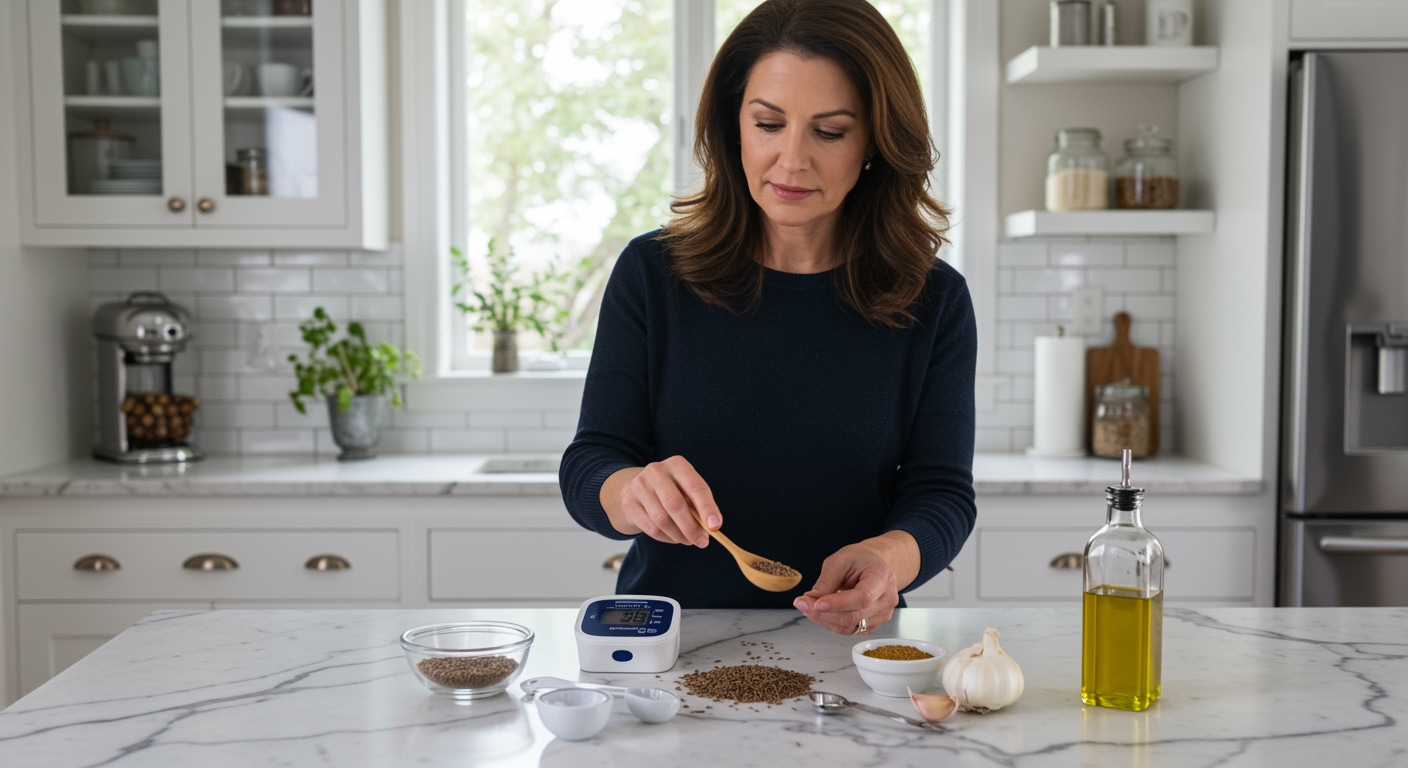✪ Key Takeaway: Hypotension patients should use cumin seeds carefully as they may lower blood pressure further in sensitive individuals.
Introduction
Your morning tea smells amazing with that pinch of cumin seeds you just added.
But if you have low blood pressure, you might wonder whether this common kitchen spice could make your condition worse.
Hi, I’m Abdur, your nutrition coach and today I’m going to explain whether hypotension patients should avoid cumin seeds and how this spice affects your blood pressure.
How Do Cumin Seeds Affect Blood Pressure?
Cumin seeds contain several bioactive compounds that can influence your cardiovascular system.
The main compound responsible for blood pressure effects is cuminaldehyde, which makes up about 25-30% of cumin essential oil.
This compound acts as a vasodilator, meaning it helps relax and widen your blood vessels.
When your blood vessels relax, blood flows more easily through them, which typically leads to lower blood pressure readings.
Research shows that cumin also contains potassium, magnesium, and other minerals that support healthy blood pressure regulation.
However, the blood pressure lowering effect varies significantly between individuals based on their current health status and sensitivity to these compounds.
✪ Fact: Cumin seeds contain over 100 different chemical compounds that work together to influence your body.
What Does Research Say About Cumin And Hypotension?
Several studies have examined cumin’s effects on blood pressure, though most focus on people with normal or high blood pressure.
A 2013 study published in complementary medicine research found that cumin extract significantly reduced both systolic and diastolic blood pressure in participants.
The participants experienced an average blood pressure reduction of 10-15 mmHg after consuming cumin regularly for 8 weeks.
Another research study showed that cumin’s antioxidant properties help improve overall cardiovascular function by reducing inflammation in blood vessels.
However, no specific studies have focused exclusively on people with hypotension, which creates a gap in our understanding.
The existing research suggests that cumin’s blood pressure lowering effects are dose-dependent, meaning larger amounts create stronger effects.
✪ Note: Most cumin research involves people with normal blood pressure, not hypotension patients specifically.
Should You Completely Avoid Cumin Seeds With Low Blood Pressure?
Complete avoidance of cumin seeds is usually unnecessary for most hypotension patients.
The amount of cumin used in typical cooking rarely contains enough active compounds to cause significant blood pressure changes.
A typical recipe might call for half a teaspoon of cumin seeds, which contains only small amounts of the blood pressure lowering compounds.
Your body can usually handle these small culinary amounts without experiencing dangerous drops in blood pressure.
However, you should be more cautious with cumin supplements, concentrated extracts, or consuming large amounts of the spice regularly.
The key is understanding the difference between using cumin as a flavoring agent versus consuming it as a therapeutic supplement.
✪ Pro Tip: Start with small amounts and monitor how your body responds before increasing cumin intake.
What Are The Warning Signs To Watch For?
Pay attention to specific symptoms that might indicate cumin is affecting your blood pressure too much.
Dizziness, especially when standing up quickly, could signal that your blood pressure has dropped lower than usual.
Fatigue, weakness, or feeling unusually tired after meals containing cumin might also indicate blood pressure changes.
Some people experience mild headaches or feel lightheaded when their blood pressure drops significantly below their normal range.
If you notice these symptoms consistently after eating foods with cumin, consider reducing your intake or consulting your healthcare provider.
Keep a simple food and symptom diary to track any patterns between cumin consumption and how you feel.
✪ Fact: Your individual response to cumin depends on your current medications and overall health status.
How Can You Use Cumin Safely With Hypotension?
Start with very small amounts, perhaps just a pinch in your cooking, and gradually increase if you tolerate it well.
Choose whole cumin seeds over ground powder when possible, as whole seeds release their compounds more slowly during digestion.
Avoid cumin supplements, extracts, or therapeutic doses unless specifically recommended by your healthcare provider.
Consider timing your cumin consumption with meals rather than on an empty stomach to slow absorption of active compounds.
Monitor your blood pressure regularly if you decide to include cumin in your diet, especially during the first few weeks.
Talk to your doctor about cumin use if you take blood pressure medications, as the combination might create additive effects.
✪ Pro Tip: Keep a blood pressure log when introducing cumin to track any changes in your readings.
The Bottom Line
Hypotension patients do not need to completely avoid cumin seeds, but they should use them thoughtfully and in moderation.
Small amounts in cooking are generally safe, but large doses or supplements require caution and medical guidance.
I would love to hear about your experiences with cumin and blood pressure in the comments below, and please share any questions you might have about managing hypotension through dietary choices.
References
At NutritionCrown, we use quality and credible sources to ensure our content is accurate and trustworthy. Below are the sources referenced in creating this article:





